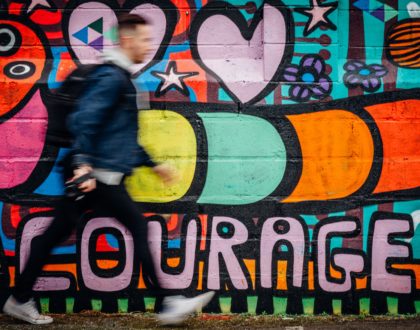Cultivating Courage to Lead in Racist Times

This article was originally published on June 7, 2018
Have you ever attended an event in which a guest speaker made racially insensitive or outright racist public remarks? Have you ever found yourself around the water cooler listening to colleagues complain about the unmerited advancement of so called “affirmative action hires”? Have you ever been tasked with leading a staff meeting that gets hijacked by someone clearly bent on spouting microaggressions? If so, can you recall the feelings their words and actions stirred in you? Were you angry? Outraged? Indifferent? Perhaps you sank into your seat, silently embarrassed for the individual whose blind ignorance was on display. Maybe you turned to a friend and whispered something funny about it to try to ease the tension of the moment. Maybe you tried to interject somehow, wanting to bring a sense of self-awareness to the person running afoul. Or maybe, you were one of the more courageous individuals who took a risk and started a conversation about your own biases, fears and stereotypes and how you’ve learned from them. However you handled yourself in that moment says something important about you, about where you are in your own ability to see, hear and contribute to healing the situation, rather than perpetuating ongoing cycles of shame, blame and avoidance.
“Setting good, healthy examples for the people around us and leading from a place of courage are choices we can all consciously make.”
In a time when people, predominantly black and brown, are literally dying in the streets, murdered in cold blood because of racism, biases, and hatred born of fear, we owe it to those lives lost, to ourselves and to one another to find ways to dialogue and elevate each other when moments like these present themselves. Take for example, the incident at Starbucks, where two black men, “Rashon Nelson and Donte Robinson were arrested and forcibly removed by police from a Starbucks while waiting to meet a (white) colleague for coffee.” [1] The stereotypes and biases present in the decision-making process of the Starbucks employee who made the 911 call, could potentially have had lethal consequences for these two men, who, for all intents and purposes, did nothing wrong and were merely attempting to peacefully coexist in shared space. There are, unfortunately, myriad examples of situations like this.
Those who have historically benefited from race privileges and are in positions of authority, regardless of specific industry, are tasked with having to do the difficult, yet necessary work of cultivating true racial awareness. Leaders across all industries are now expected to make smarter, more perceptive decisions that cultivate genuine diversity and inclusion practices in their organizations. When it comes to racism and all associated behaviors, it is futile and exceedingly unacceptable to merely ridicule colleagues, peers, family members or friends for their shortcomings. The fact is that none of us are perfect. We all have some lacuna we fiercely hide or desperately refuse to acknowledge. All of us struggle to be just, and fair, and righteous. And all of us trip over our own stupidity every once in a while.
It does no good to just point fingers and pretend as though that could never be you out there, making decisions that impact and alter the lives of others or saying things you might later regret. As witnesses, we are all complicit in these failures. Perhaps we cringe at these incidents because we recognize something of ourselves in such terrible moments, a glimpse of our own hidden biases or a fragment of our cowardice reflected back at us through another person’s flawed self. Somewhere deep down inside, many, if not most of us are afraid that that could just as well be us out there, with our ignorance on full display for everyone to see and criticize.
How do we get past these moments in ways that feel more humane, connected, awake, aware and whole? How do we shift our reactions to racism so as to make something new and life-giving come of it? Who are we in all of this? It is worth asking these questions and worth exploring the truths surfaced in self-reflection. Setting good, healthy examples for the people around us and leading from a place of courage are choices we can all consciously make. We owe it to one another to start, wherever we find ourselves, cultivating the courage to lead in racist times. We owe it to the people we love and care about, to believe in the possibility of a better world and to start moving toward it, one open dialogue at a time.
Are you ready to cultivate courageous and inclusive leadership at your organization? YW Boston’s DEI services are designed to help you create unique solutions to a variety of diversity, equity, and inclusion challenges. Contact us today for a free consultation.
